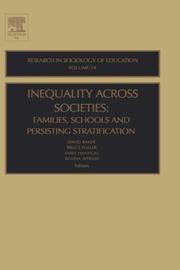| Listing 1 - 4 of 4 |
Sort by
|
Book
ISBN: 9781848550957 1848550952 1280770945 9786613681713 1848550944 1781901511 9781848550940 Year: 2009 Publisher: Bingley Emerald Group Publishing Limited
Abstract | Keywords | Export | Availability | Bookmark
 Loading...
Loading...Choose an application
- Reference Manager
- EndNote
- RefWorks (Direct export to RefWorks)
This volume of "International Perspectives on Education and Society" investigates the often controversial relationship between gender, equality and education from international and comparative perspectives. Much has been written recently about the global progress made toward gender parity in enrolment and curriculum in nations around the world. And there is much to tout in these areas. Although gender parity is not yet the global norm, the expectation of gender equality increasingly is. Some have gone so far as to say that the global expansion of modern mass schooling has created a world culture of gender equality in education. Yet, while there have been many positive advances regarding girls' and women's education around the world, there are still significant differences that are institutionalized in the policies and administrative structures of national education systems. For example, some of the strongest evidence of gendered inequality in schooling is the fact that in many developing countries there are large proportions of school-age children who are not in school - many if not most of whom are girls. The question this volume investigates is whether gender equality in education is really being achieved in schools around the world or not.
Women. --- Educational equalization. --- Sex discrimination in education. --- Comparative education. --- Education --- Education and globalization. --- International cooperation. --- Educational inequality --- Equal education --- Equal educational opportunity --- Equalization, Educational --- Education, Comparative --- Globalization and education --- Affirmative action programs in education --- Globalization --- Aims and objectives --- History --- Educational equality --- Educational equity --- Equality of education --- Equity, Educational --- Inequality, Educational --- Opportunity, Equal educational --- Education. --- Social groups. --- General.
Book
ISBN: 1402097387 9786612924347 1402097395 1282924346 Year: 2009 Publisher: [Dordrecht] : Springer,
Abstract | Keywords | Export | Availability | Bookmark
 Loading...
Loading...Choose an application
- Reference Manager
- EndNote
- RefWorks (Direct export to RefWorks)
This, the sixth volume in Springer’s Globalisation, Comparative Education and Policy Research series, presents scholarly research on major discourses of race, ethnicity and gender in education. It is a sourcebook of ideas for researchers, practitioners and policy makers in education, globalisation, social justice, equity and access in schooling around the world. The aim of the book is to provide an easily accessible, practical yet scholarly source of information about issues of international concern in the field of globalisation and comparative education. Readers will also find here the very latest thinking on race, ethnicity and gender in the context of global culture. Editors Zajda and Freeman have compiled perspectives on education and policy research that are relevant to progressive pedagogy, social change and transformational educational reforms in the 21st century. The book critically examines the interplay between state, ideology and current discourses of race, ethnicity and gender in the global culture. It draws on recent research in the areas of globalisation, equity, social justice, and the role of the State. The authors also explore conceptual frameworks and methodological approaches that could be applied to research covering the State, globalisation, race, ethnicity and gender, and analyze existing inequalities due to race, ethnicity and gender and resultant social stratification. Finally, the book demonstrates the neo-liberal ideological imperatives of education and policy reform, affecting race, ethnicity and gender, and illustrates the way the relationship between the State and education policy affects current trends in education policy as well as reforms in the fields of race, ethnicity and gender.
Education -- Cross-cultural studies. --- Educational equalization. --- Sex differences in education. --- Theory & Practice of Education --- Education --- Social Sciences --- Educational inequality --- Equal education --- Equal educational opportunity --- Equalization, Educational --- Education. --- International education. --- Comparative education. --- Educational sociology. --- Education and sociology. --- Sociology, Educational. --- International and Comparative Education. --- Sociology of Education. --- Affirmative action programs in education --- Aims and objectives --- Educational equality --- Educational equity --- Equality of education --- Equity, Educational --- Inequality, Educational --- Opportunity, Equal educational --- Sex differences

ISBN: 1281049174 9786611049171 1849505047 0080478638 9781849505048 0762314419 9780080478630 9780762314416 Year: 2009 Publisher: Bingley Emerald Group Publishing Limited
Abstract | Keywords | Export | Availability | Bookmark
 Loading...
Loading...Choose an application
- Reference Manager
- EndNote
- RefWorks (Direct export to RefWorks)
Since the World Conference on Education for All (EFA) in Jomtien, Thailand in 1990, the push for modern mass schooling has become a primary focus of national education policymakers and researchers around the world. The EFA declaration that grew out of this conference served as a culmination of a century-long movement to transform existing national educational systems into the most comprehensive mass system of schooling ever devised. Comparative education researchers have been studying both the promises and the challenges surrounding EFA for decades, but in comparative education research literature there is still neither consensus on the impact that EFA has nor clearly identified global trends in either EFA policymaking or policy implementation. It seems that for every promise that EFA brings, there is an accompanying challenge.It is this struggle between the global promises and the national challenges that this volume of "International Perspectives on Education and Society" seeks to identify and explain. Chapters range from critical syntheses of EFA policymaking or policy implementation to original comparative education research on the impact that EFA has had in specific nations or across clusters of nations. It compares and contrasts the promises of EFA v. implementation of policy. The international contributions ensure global coverage of content. It is part of the "International Perspectives on Education and Society" series.
Education --- Educational assistance --- Basic education. --- Educational equalization. --- International cooperation. --- Aims and objectives. --- Educational inequality --- Equal education --- Equal educational opportunity --- Equalization, Educational --- Basic skills education --- Aims and objectives of education --- Educational aims and objectives --- Educational goals --- Educational objectives --- Educational purposes --- Goals, Educational --- Instructional objectives --- Objectives, Educational --- Purposes, Educational --- Affirmative action programs in education --- Underprepared college students --- Educational sociology --- Aims and objectives --- Educational equality --- Educational equity --- Equality of education --- Equity, Educational --- Inequality, Educational --- Opportunity, Equal educational --- Education. --- General.

ISBN: 0762310618 1849502412 9786611016166 1281016160 0080473032 9781849502412 9780080473031 9780762310616 9781281016164 6611016163 Year: 2009 Publisher: Bingley Emerald Group Publishing Limited
Abstract | Keywords | Export | Availability | Bookmark
 Loading...
Loading...Choose an application
- Reference Manager
- EndNote
- RefWorks (Direct export to RefWorks)
Most societies place great faith in the modern school's power to offer children a more prosperous future, from better jobs to wider social opportunities. In turn, political leaders around the world push to expand western forms of schooling, creating more slots for children, from preschool through university levels. Yet despite this remarkable institutional change, are societies becoming equitable, especially for those groups living on the margins of civil society? Why, in too many cases, has schooling failed to deliver on its promise of reducing economic and social disparities? This volume addresses these questions, taking the reader into a variety of nations and cultural settings. With studies from Europe, the Middle East, Africa, and Asia, the volume illuminates how schools can reduce or reinforce the layered stratification of society, even in nations with non-western traditions. The contributors, diverse in their own origins and viewpoints, advance our understanding of stratification by highlighting how a nation's history, particular institutions, and cultural context shape the school's efficiency as an agent of equity. The chapters move beyond individual conceptions of attainment and distinguish near-universal versus country-specific mechanisms that characterize the interplay between school expansion and inequality. It shows how schools can reduce or reinforce the layered stratification of society, even in nations with non-western traditions.
Educational equalization --- Educational sociology --- Income distribution --- Social stratification --- #SBIB:316.334.1O340 --- 316.34 --- 316.34 Sociale differentiatie. Sociale typologie. Sociale stratificatie --- Sociale differentiatie. Sociale typologie. Sociale stratificatie --- Stratification, Social --- Equality --- Social structure --- Social classes --- Distribution of income --- Income inequality --- Inequality of income --- Distribution (Economic theory) --- Disposable income --- Education and sociology --- Social problems in education --- Society and education --- Sociology, Educational --- Sociology --- Education --- Onderwijs en sociale verandering, onderwijs en samenleving --- Aims and objectives --- Educational sociology. --- Social stratification. --- Educational equalization. --- Income distribution. --- Education. --- Social discrimination. --- Social Science --- General. --- Popular Culture. --- Educational equality --- Educational equity --- Educational inequality --- Equal education --- Equal educational opportunity --- Equality of education --- Equalization, Educational --- Equity, Educational --- Inequality, Educational --- Opportunity, Equal educational --- Affirmative action programs in education
| Listing 1 - 4 of 4 |
Sort by
|

 Search
Search Feedback
Feedback About UniCat
About UniCat  Help
Help News
News